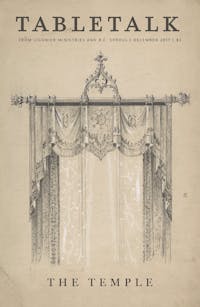
Request your free, three-month trial to Tabletalk magazine. You’ll receive the print issue monthly and gain immediate digital access to decades of archives. This trial is risk-free. No credit card required.
Try Tabletalk NowAlready receive Tabletalk magazine every month?
Verify your email address to gain unlimited access.
The elders of our small church convened many years ago to examine our seven-year-old son for admittance to the Lord’s Table. I sat behind his right shoulder as he fielded numerous questions about the Christian faith and his grasp of the sacraments. Then one of the elders asked, “Young man, when we eat the bread and drink the cup, are we eating the literal body of Jesus Christ? Are we drinking His physical blood?” Our son paused for a moment. He turned slowly as he looked back over his shoulder at me with widened eyes, his face crinkled in perplexity, and then he faced the elders again as he resolutely shouted, “No!” The good elders heartily affirmed his rejection of the Roman Catholic doctrine of transubstantiation.
This scenario, though varied as to time and circumstance, has been reenacted for hundreds of years in Reformed churches. While Scripture does not provide a specific age for partaking of the Lord’s Supper, the historic and widespread agreement has been that a child’s participation requires a credible profession of faith and understanding of the sacrament. Question 177 of the Westminster Larger Catechism says that while baptism is to be administered “but once . . . and that even to infants,” the Lord’s Supper is different. Participating in the supper by faith serves as “spiritual nourishment to the soul, and to confirm our continuance and growth in him, and that only to such as are of years and ability to examine themselves.” Faith is nourished through the sacrament only as the gospel is preached and believed.
Scripture undergirds this historic practice. In 1 Corinthians 11:23–29, the Apostle Paul’s instructions call for a discerning faith as he gives narrowed instructions regarding the Lord’s Supper. As often as the church gathers together, believers are to heed the Lord’s command to “do this in remembrance of me” (v. 24). Along with remembering, the participant is to “take,” “eat,” “drink,” and “proclaim” (v. 26). The need to examine oneself (v. 28) and the danger of eating and drinking without discerning the body (v. 29) echo the need for all participants—regardless of age—to possess a conscious awareness of the Lord’s sacrifice on our behalf.
The need for a vital, trusting, and repentant faith leads us to consider suggestive steps in teaching our children about the sacrament. First, we must pray for ourselves and our children. The Holy Spirit must enliven the spiritually dead heart of anyone who would believe, including the hearts of our children and grandchildren (Eph. 2:1). This reality places us on our knees before a sovereign God. Our prayers should be marked with confidence in our covenant God, though not passionless presumption. The Lord regards children of believing parents as “holy,” as we read in 1 Corinthians 7:14, set apart by God from this world. Thus, we pray not only for them but with them.
Second, we must tell the story of God’s redemption to our younger children in their concrete learning preschool years. In Deuteronomy 6:4–7, we read:
Hear, O Israel: The Lord our God, the Lord is one. You shall love the Lord your God with all your heart and with all your soul and with all your might. And these words that I command you today shall be on your heart. You shall teach them diligently to your children, and shall talk of them when you sit in your house, and when you walk by the way, and when you lie down, and when you rise.
In other words, we take every opportunity to tell the story of God’s grace from Genesis to Revelation. We make sure our children know that Jesus is our Commander. He calms even the Sea of Galilee (Mark 4:35–41). Thus, when He says of the supper, “Do this in remembrance of me,” we observe it in love and obedience (Matt. 26:26; Mark 14:22–24; Luke 22:19). We tell the story of the Passover in Exodus 12 and remind our children—like the children of the exodus—that the blood placed over the door of the Israelites foreshadowed the ultimate covering of protection in Jesus Christ, the Lamb of God, who is our Passover Lamb (1 Cor. 5:7).
Third, as our children mature in the elementary years, so does their capacity for symbolism and conceptual learning. Our Reformed confessions and catechisms continue to prove of great use as outlines for our lessons. Take advantage of communicants classes at church. At home, convey the need to prepare for the meal in examining our lives, repenting daily, and resting in His forgiveness (Westminster Larger Catechism 170–175; Westminster Shorter Catechism 97). Speak of the need for a sober awareness of the Lord’s body given and His blood shed for our sins while also explaining how we eat and drink in joyful union with the body of Christ. Explain how we truly and really commune with our risen Head, Jesus Christ—through His Spirit—as He rules and reigns over all things.
God gives officers of His church solemn responsibilities. Though parents wield the rod of correction, the officers hold the keys of the kingdom, administering church discipline (Matt. 16:19). This is why we teach our children the need for fencing the Lord’s Table—excluding the nonrepentant as unworthy to take the supper (1 Cor. 11:27). Yet herein lies a golden gospel opportunity. While the Lord will not countenance the proud at His table, He beckons the poor in spirit (Matt. 5:3). So we teach them to repent daily and trust Jesus. We remind them that we parents also are wretched sinners apart from Christ. Yet together, by His grace, we shall eat and drink with all of God’s children at the wedding supper of the Lamb forever (Rev. 19:6–9).
